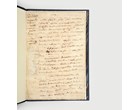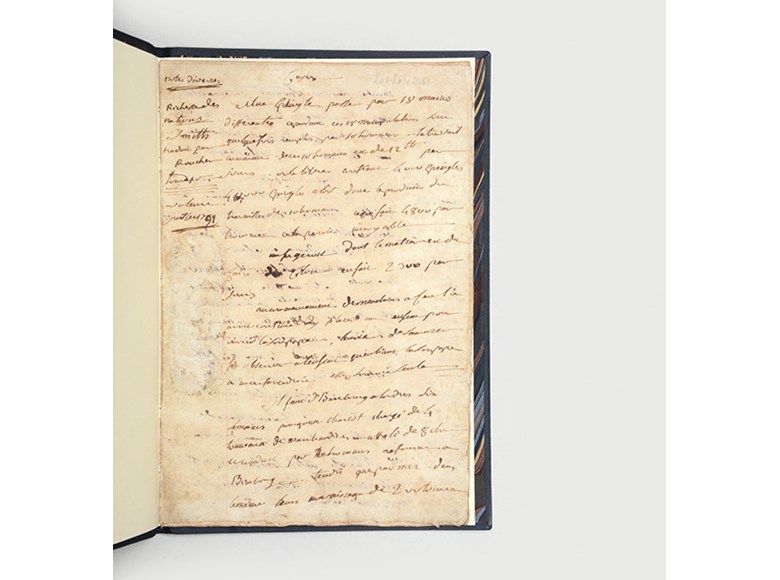 BACK TO GALLERY
BACK TO GALLERY
Peter Harrington
Napoleon Bonaparte
Autograph manuscript notes on Adam Smith’s Wealth of Nations.
The young Napoleon responds with delight to the foundational work of political economy
Folio (288 x 195 mm).
description
An exceptional manuscript in Napoleon’s hand revealing his initial response to Smith’s Wealth of Nations. The manuscript is remarkable in establishing that Napoleon’s first unguarded reaction to Smith’s ideas was not in fact disdain, as he would later affect, but admiration.
Napoleon was in garrison at Valence with the 4th Artillery Regiment from 16 June to 31 August 1791. He used his spare time to read the first volume of the French translation of Smith’s Wealth of Nations by the poet Jean-Antoine Roucher (1745-1794), made from the fourth English edition (London, 1786), which had been published in 1790. Napoleon has captioned in the margin: “Notes diverses. Richesse des nations - Smith traduit par Roucher. Tome 1er. Valence juillet 1791”, and has written at the top of the first page “Cayer -” (i.e. cahier), leaving a space blank for a projected numbering. He focuses in particular on five chapters of Book I: Chapter 1, Of the division of labour; Chapter 3, That the division of labour is limited by the extent of the market; Chapter 4, Of the origin and use of money; Chapter 5, Of the real and nominal price of commodities, or of their price in labour, and their price in money; and Chapter 8, Of the wages of labour. The last note in Napoleon’s hand is: “The labourer and the farmer are superior in intelligence to the ordinary class of artisans” (our translation).
Smith’s biographer remarks: “It is clear from the notes that Napoleon is delighted with Smith’s picture of economic life, particularly in relation to wages, price, transport, the concept of a European market, and the division of labour resulting in the mass production of pins (‘cela paraît incroyable’)” (Ross, p. 18). It later suited Napoleon to disdain Adam Smith, as did many French economists, because he had been critical of Colbertism, but in power he was happy to give free rein to his Minister of the Public Treasure, François Nicholas Mollien, who was a lifelong vocal admirer of the Wealth of Nations.
Napoleon was in garrison at Valence with the 4th Artillery Regiment from 16 June to 31 August 1791. He used his spare time to read the first volume of the French translation of Smith’s Wealth of Nations by the poet Jean-Antoine Roucher (1745-1794), made from the fourth English edition (London, 1786), which had been published in 1790. Napoleon has captioned in the margin: “Notes diverses. Richesse des nations - Smith traduit par Roucher. Tome 1er. Valence juillet 1791”, and has written at the top of the first page “Cayer -” (i.e. cahier), leaving a space blank for a projected numbering. He focuses in particular on five chapters of Book I: Chapter 1, Of the division of labour; Chapter 3, That the division of labour is limited by the extent of the market; Chapter 4, Of the origin and use of money; Chapter 5, Of the real and nominal price of commodities, or of their price in labour, and their price in money; and Chapter 8, Of the wages of labour. The last note in Napoleon’s hand is: “The labourer and the farmer are superior in intelligence to the ordinary class of artisans” (our translation).
Smith’s biographer remarks: “It is clear from the notes that Napoleon is delighted with Smith’s picture of economic life, particularly in relation to wages, price, transport, the concept of a European market, and the division of labour resulting in the mass production of pins (‘cela paraît incroyable’)” (Ross, p. 18). It later suited Napoleon to disdain Adam Smith, as did many French economists, because he had been critical of Colbertism, but in power he was happy to give free rein to his Minister of the Public Treasure, François Nicholas Mollien, who was a lifelong vocal admirer of the Wealth of Nations.






 SEND AN EMAIL
SEND AN EMAIL